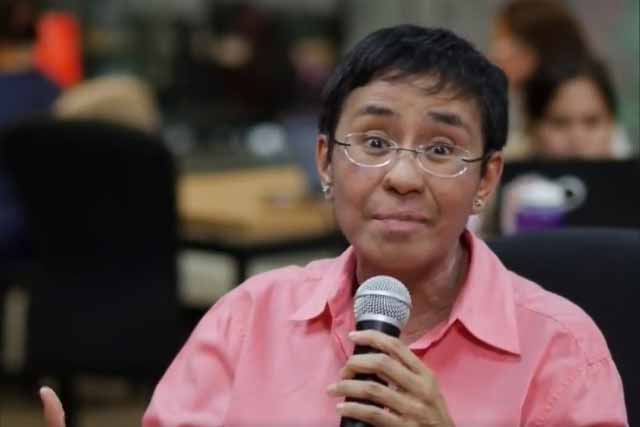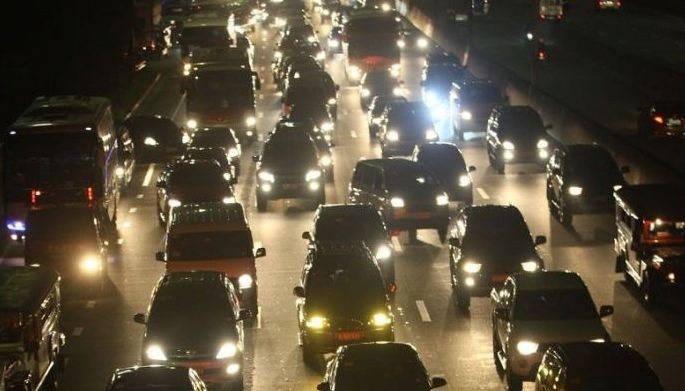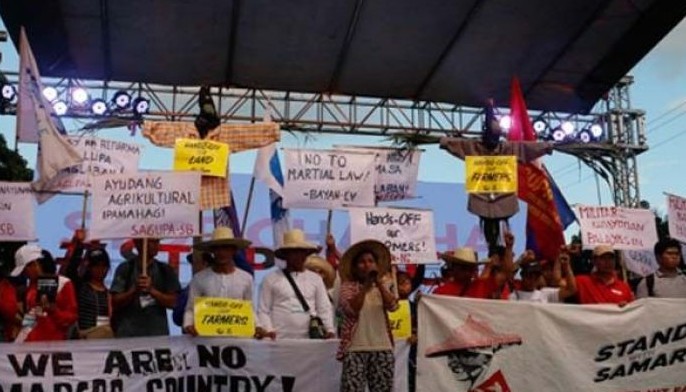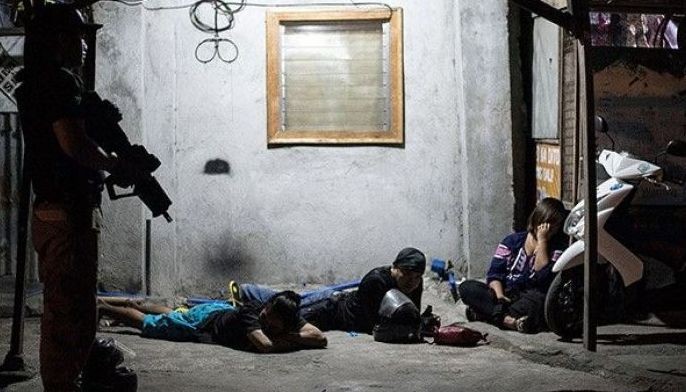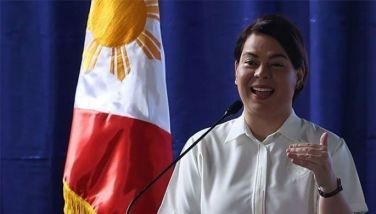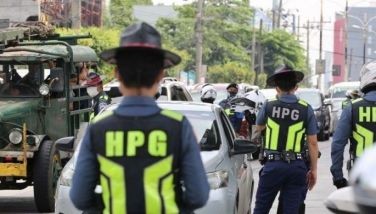In the shadow of a strongman: Climate of chaos and disorder
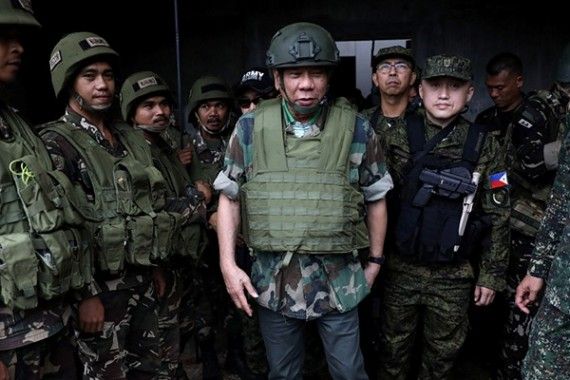
Part 2: A climate of chaos and disorder
MANILA, Philippines (Originally published on March 2, 2018) — Experts interviewed by Philstar.com think that the Philippines under President Rodrigo Duterte is spinning toward a dictatorship.
However, this is where the comparison between him and former President Ferdinand Marcos ends as their versions of authoritarianism are situated under different societal, political and economic conditions.
Duterte is mounting his allegedly authoritarian government without any explicit declaration and at a time when he is at the apex of his popularity, according to Randolf “Randy” David of the University of the Philippines Department of Sociology.
An air of instability
The president is fortunate to have inherited a good economy and surplus of money from the previous administration, according to former Commission on Human Rights Chairperson Loretta Rosales and to David.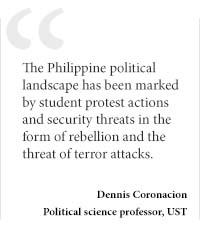
In contrast, by the time Marcos declared martial law, the Philippines was in economic doldrums, and his popularity was at record lows.
“That is a big difference,” David said.
The country’s macroeconomic fundamentals remain good, but some Filipinos are feeling an economic pinch from increases in the prices of goods and services because of the first “package” of tax reform, which went into effect at the start of this year.
Some areas in the country have also reported shortages in the supply of government-subsidized rice, but the Department of Agriculture has maintained that the country has enough of the staple grain and that this deficiency is due to unscrupulous traders who repackage National Food Authority rice for profit.
Last month, a report by the Japan International Cooperation Agency said that the Philippine economy loses P3.5 billion daily to traffic gridlocks in Metro Manila.
The Metro Rail Transit, the rail line that services EDSA, one of the busiest avenues in the capital, continues to deteriorate, with only seven trains servicing more than 250,000 passengers.
These transportation woes have prompted Sen. Grace Poe to renew her call to grant Duterte emergency powers to deal with these issues, but the administration has been criticized in the past for lacking the necessary push to pass the bill into law.
Dennis Coronacion, a political science professor at the University of Santo Tomas, said that today’s political and social atmosphere has similarities to the period leading to the martial law declaration in 1972.
Then and now, the Philippine political landscape has been marked by student protest actions and security threats in the form of rebellion and the threat of terror attacks, he said.
Marcos exaggerated the threat the Maoist rebels were posing to society, his critics have said.
To create the atmosphere needed for the declaration of military rule, he orchestrated bombings in different parts of the capital and the ambush of his then Defense Minister Juan Ponce Enrile.
Coupled with the rising tide of student protests, the late strongman used these attacks to justify placing the Philippines under martial law.
In the case of the current Philippine leader, Duterte placed the entire island of Mindanao under martial law after Islamist militants tried to take over Marawi City, the country’s only Islamic city.
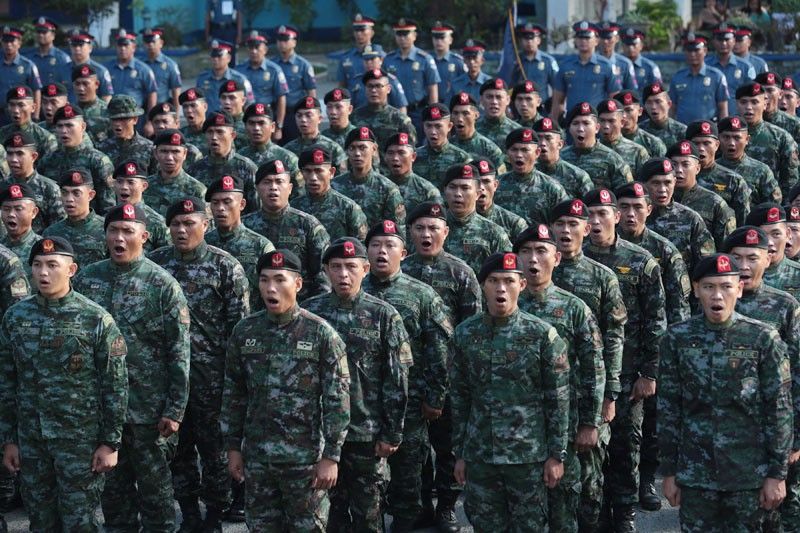
Other key cities in the South are at risk of another terrorist attack similar to the Marawi siege launched by the IS-inspired Maute group, PNP chief Director General Ronald dela Rosa said during a press conference at Camp Crame last February 27, 2018. Michael Varcas
Philippine security forces were able to liberate the lakeside city after a five-month battle that destroyed much of its central business district.
Duterte got the approval of the Congress for the extension of military rule in Mindanao until the end of 2018, this time including the communist threat as a justification for the decision.
The measure has been greeted by business groups and by online commenters as an opportunity to boost investor confidence and supposedly improve the business climate in the region.
Criticism and reports of human rights violations have been emerging from the margins of Mindanao but concerns raised by those from Luzon and Visayas have been dismissed as “imperial” interference.
‘The Disappeared’
Rosales said that another feature similar between the two presidents is the rampant cases of alleged human rights abuses and summary killings.
During Marcos’ 21-year strongman rule, many critics, political opponents and activists disappeared and were tortured.
Rosales herself was jailed, tortured and abused.
Thousands of these individuals, known as desaparecidos, remain missing until today, with only a monument bearing their names left to make their loved ones and the succeeding generations of Filipinos remember their plight.
Human rights advocates claimed that there have been thousands of extrajudicial killings under Duterte's war on drugs.
"More than 12,000 suspected drug users and dealers, mostly from poor families in urban centers across the country, are estimated to have died in the 'drug war,' including an estimated 4,000 during operations led by the police and the remainder by 'unidentified gunmen'," Human Rights Watch said in a statement following the release of its World Report 2018 on January 28.
“President Duterte has not only resisted calls to end his brutal ‘drug war,’ but has used populist rhetoric to disparage the brave activists who have been investigating and denouncing his cruel campaign,” Phelim Kine, deputy Asia director, said in the statement.
“Since Duterte will never undertake a serious investigation into the ‘war on drugs,’ it’s up to the United Nations to support an international investigation and bring the mass killings to a stop.”
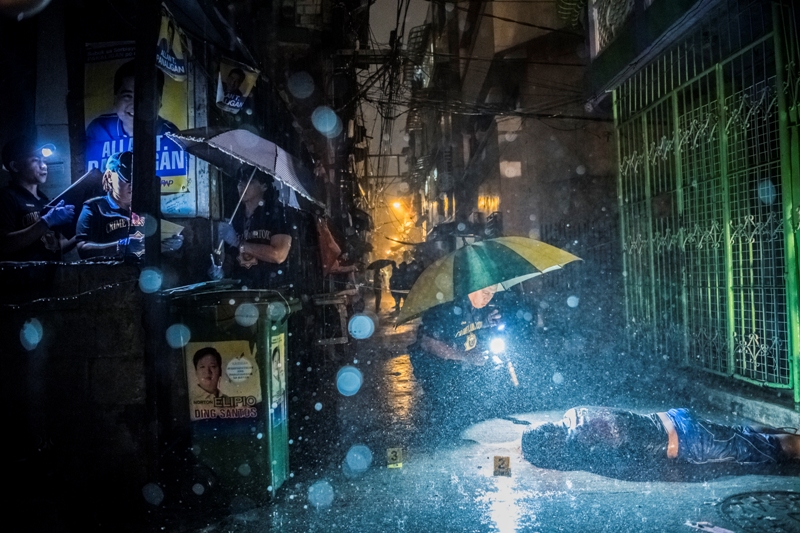
Authorities inspect the crime scene of an alleged extrajudicial killing. File
Both leaders have exaggerated the threat that the Maoist rebels pose to the Philippines, according to Coronacion.
He and Rosales said that the communist movement during Marcos’ time was not significant enough to warrant the declaration of martial law.
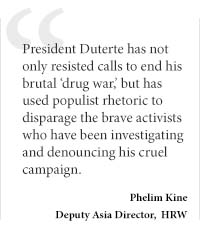
“There was no such danger,” Rosales said.
Coronacion said that some studies show that the martial law declaration in 1972 even led to the strengthening of the communist and Moro secessionist movements.
According to the Martial Law Museum of the Ateneo De Manila University, independent reports showed that there were only about 1,000 Maoist rebels, who had old-fashioned arms, at the time of martial law declaration.
It said that in the rebels’ own history only 350 men with “first-line rifles” were documented at the time of the declaration of military rule. Toward the end of military rule, however, the numbers had grown from about 1,500 in 1976 to 35,000 in 1985, the museum said.
“Reports on the increased following of the radical movement emphasize the role of idealistic youth, fed up with the abuses committed during the regime,” the Martial Law Museum said.
Coronacion opined that although extremist militants such as the Abu Sayyaf and the Islamic State-inspired groups poses a real danger to Mindanao, the recent extension of martial law in the island south of Manila is unjustified, a point that Rosales echoed.
Quelling criticism
The press today is hesitant to question the president, who has shown his willingness to use the vulnerabilities of owners of media organizations against them if their news outfits become too pesky, said David.
The Securities and Exchange Commission gave Rappler a shutdown order when following allegations that it infringed on constitutional prohibition on foreign ownership of media companies.
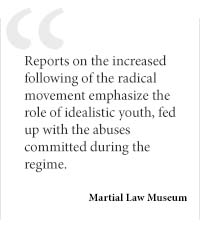
Rappler has questioned the order before the Court of Appeals and continues to operate while it is not yet final and executory.
Duterte has also accused the family that owns the Philippine Daily Inquirer of failure to pay taxes in their other businesses and of occupying a government piece of property beyond the contract period.
That property has since been taken over by government and the Prietos are in talks to sell off their interest in the Inquirer.
When Marcos declared military rule in 1972, he ordered the closure of critical TV stations, newspapers and magazines and allowed only those owned by his allies to operate.
He sent soldiers to the editorial offices of these news outfits and arrested journalists.
According to Coronacion, Marcos needed to remove voices of dissent for the survival of his regime.
Duterte, meanwhile, has been slamming news outlets because of a perceived sensitivity to criticism and his need to dominate the country’s political discourse as part of his efforts to consolidate power, Coronacion said.
Citing the Securities and Exchange Commission shutdown order on Rappler, Duterte banned its palace reporter, Pia Ranada, from entering the presidential complex and covering the president’s engagements.
The reason for the ban has varied since, but the ban itself remains in place.
The news website, one of the most critical of the president and his officials, has decried this decision and described it as an affront to the freedom of the press.
Aside from his aggressiveness in attacking unfriendly media outfits, Duterte has also been accused of maintaining paid online operatives, or trolls.
These individuals reportedly post information and links online meant to confuse Filipinos and muddle issues.
They are also the most ruthless in defending the president against critics, with some resorting to verbal assault and threats of bodily harm.
International studies have shown that the Duterte campaign in 2016 spent millions of pesos in maintaining its “troll” army.
The Palace, in its defense, has said it has never tolerated “fake news”, or propaganda and misinformation packaged to look like legitimate news articles.
The denial was met with raised eyebrows by critics.
*This special report for the 32nd anniversary of the People Power Revolution is the second of three parts.
In the shadow of a strongman (Part 1): "You set aside institutions in favor of an instinctive, implicit trust in somebody whom you like, who you think is good for the country, whatever he says, whatever he does"
- Latest
- Trending






